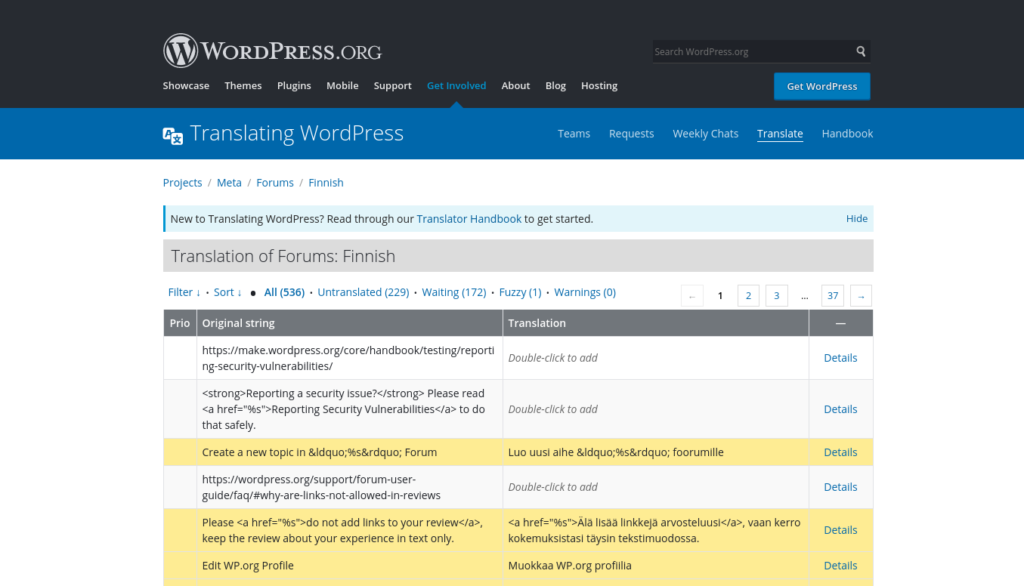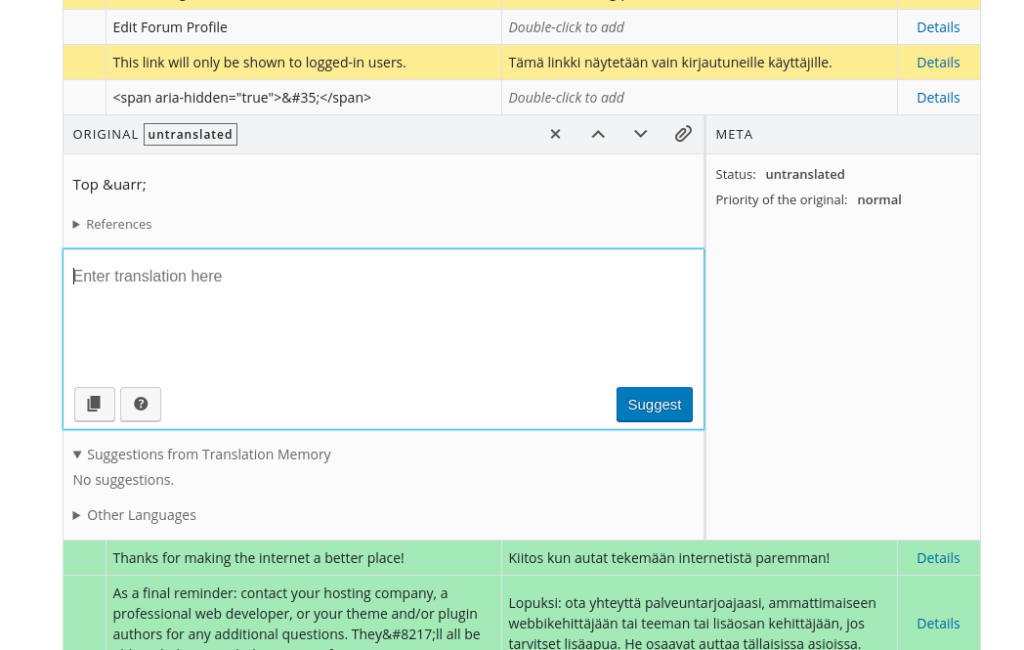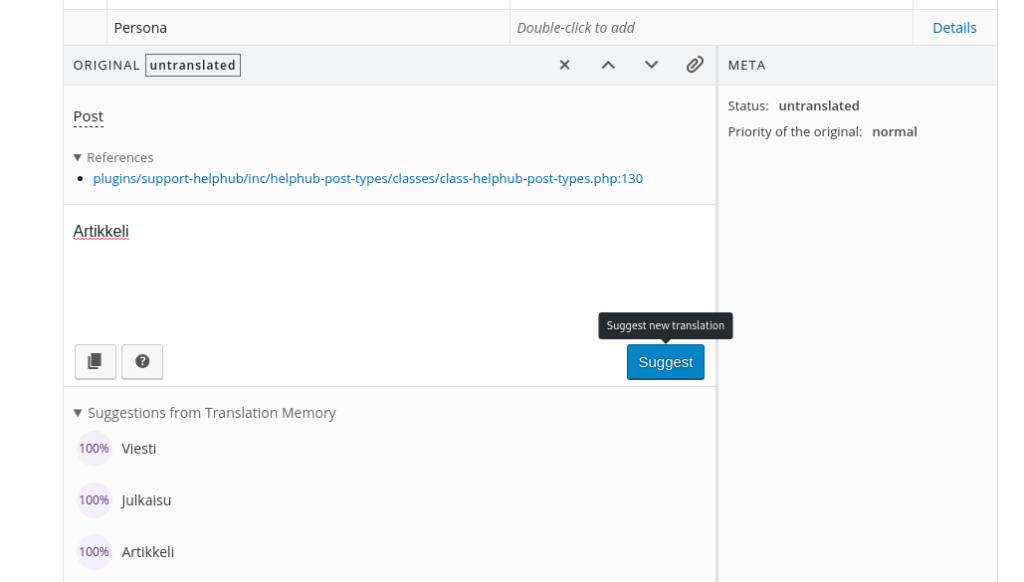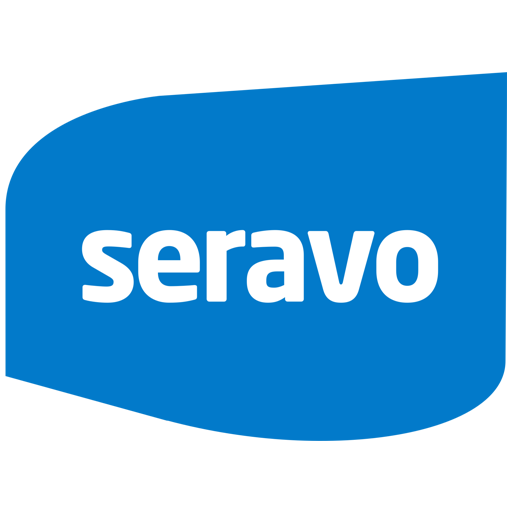About a third of the websites in the world are currently running on WordPress. Behind the success of the platform is a passionate community that tirelessly works to maintain and develop it. Most of the volunteers behind WordPress simply want to be a part of one of the largest open-source projects in the world, but for some WordPress is also the way to earn a living.
WordPress Lives from Participation
WordPress is like any other open-source project in the sense that it needs an active communication to put in the hours for maintaining and improving the platform. Localization is an essential part of that work. That work is just as important with smaller languages like Finnish. For any language there is a potential user base that doesn’t necessarily have a grasp of the often very technical lingo in English.
The desire to be able to find a wider audience for a tool that one thinks is worth it is one of the reasons to volunteer on localization. This is what brought Daniel Koskinen to translating WordPress to Finnish.
Back in 2008, the Finnish localization of WordPress was packed with terminology related to blogging, which sparked Daniel’s desire to bring a less blog-centric approach for the benefit of his clients. One telling example of this initiative that you can still find in the current Finnish localization is the term “artikkeli” (article in English) for blog posts instead of the slightly misleading term”blogi” (blog in English) that was used before.
At times you can also find a good product or a part that is built on open-source software but hasn’t yet been localized into your language, a WordPress plugin, for example. Luckily the barrier of entry is much lower in doing translations and localization than proposing a change to the source code of the project proper.
In most cases I think the participation starts from some personal need. Someone needs something for their own, or their client’s site or application and some feature is missing, so they do it on their own.
Daniel Koskinen
A lot has been done within the WordPress community to make sure that participation opportunities aren’t limited to programming. Without active participants WordPress would not be as widespread and polished a platform as it is today. This makes it essential to inspire new participants with a positive example.
As this work offers no other reward than the warm and fuzzy feeling of seeing things get done, it’s vital to show potential contributors that that feeling itself is often enough.
Toni Laakso
Seravo is an active participant in many open-source projects and WordPress is naturally one of them. Toni Laakso has been involved in the localization efforts since the WordPress version 5.0 and he is curre
A beginner might find it difficult to translate single words or short sentences without any context to work with. It’s possible to reach a uniform result and good quality in localization by browsing other translations within the context and by utilizing the glossary whenever possible.
It’s not feasible to always aim for perfection, so I allow some freedom to myself and others. I won’t deliberately do translations that conflict with the glossary, nor accept them, but I’ll happily accept something a little imperfect or original, as long as it is grammatically correct and gets the point across.
Toni Laakso
How challenging something is to translate also depends on the subject. Sentences within the WordPress core are often kept in context so well that actual translation issues rarely come up. With third-party plugins, it’s possible to run into a case where it’s nearly impossible to form a good translation.
When possible, I try to think of the text I’m translating in my own words, as it would be said in Finnish, instead of directly translating it word for word.
Daniel Koskinen
WordPress Localization in Practice
In the spirit of open-source software, anyone is free to take part in localization as well. Participating in translating the WordPress core, plugins, themes, mobile apps or the WordPress.org site is very straightforward. Simply head over to the WordPress translation pages where you will also find a handy guide for the translators.
Once you’ve selected the language you wish to work on, you will be shown all the text strings still waiting for translation in the project and possible sub-projects:

All of the text to be translated is split into individual string variables. These strings form the text portion of the software, plugin, theme or site. This causes some of the strings to be hard to understand at times, as it’s not always clear what context the individual word or phrase is used in.

Once you’re satisfied with your translation, you can send it as a proposed translation for the editors to approve. All translations must be approved in this manner to ensure a uniform end product. As anyone can propose a translation, without this step

Once an editor approves your proposed translation, it will be added to the project and you will have immortalized yourself as a participant in WordPress development! On the WordPress translation pages, you can find a ranking list which shows the translators who have done the most individual translations. Getting one’s name on this list is a reward in itself and it’s one of the important incentives for new contributors. Without motivated participants, a project relying on volunteer work simply wouldn’t survive.
Being volunteer-driven does bring some challenges for the project.
Start translating and leave your mark in history as one of the active developers of WordPress!

